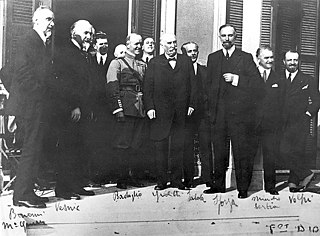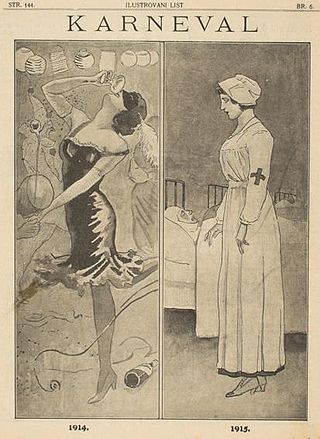
At the time of the Roman Empire, the area of modern Croatia comprised two Roman provinces, Pannonia and Dalmatia. After the collapse of the Western Roman Empire in the 5th century, the area was subjugated by the Ostrogoths for 50 years, before being incorporated into the Byzantine Empire.
The politics of Croatia are defined by a parliamentary, representative democratic republic framework, where the Prime Minister of Croatia is the head of government in a multi-party system. Executive power is exercised by the Government and the President of Croatia. Legislative power is vested in the Croatian Parliament. The Judiciary is independent of the executive and the legislature. The parliament adopted the current Constitution of Croatia on 22 December 1990 and decided to declare independence from Yugoslavia on 25 May 1991. The Constitutional Decision on the Sovereignty and Independence of the Republic of Croatia came into effect on 8 October 1991. The constitution has since been amended several times. The first modern parties in the country developed in the middle of the 19th century, and their agenda and appeal changed, reflecting major social changes, such as the breakup of Austria-Hungary, the Kingdom of Serbs, Croats and Slovenes, dictatorship and social upheavals in the kingdom, World War II, the establishment of Communist rule and the breakup of the SFR Yugoslavia.

The Kingdom of Yugoslavia was a country in Southeast and Central Europe that existed from 1918 until 1941. From 1918 to 1929, it was officially called the Kingdom of Serbs, Croats, and Slovenes, but the term "Yugoslavia" was its colloquial name due to its origins. The official name of the state was changed to "Kingdom of Yugoslavia" by King Alexander I on 3 October 1929.

The Croatian Parliament or the Sabor is the unicameral legislature of Croatia. Under the terms of the Croatian Constitution, the Sabor represents the people and is vested with legislative power. The Sabor is composed of 151 members elected to a four-year term on the basis of direct, universal and equal suffrage by secret ballot. Seats are allocated according to the Croatian Parliament electoral districts: 140 members of the parliament are elected in multi-seat constituencies. An additional three seats are reserved for the diaspora and Croats in Bosnia and Herzegovina, while national minorities have eight places reserved in parliament. The Sabor is presided over by a Speaker, who is assisted by at least one deputy speaker.

The Treaty of Rapallo was an agreement between the Kingdom of Italy and the Kingdom of Serbs, Croats and Slovenes in the aftermath of the First World War. It was intended to settle the Adriatic question, which referred to Italian claims over territories promised to the country in return for its entry into the war against Austria-Hungary, claims that were made on the basis of the 1915 Treaty of London. The wartime pact promised Italy large areas of the eastern Adriatic. The treaty, signed on 12 November 1920 in Rapallo, Italy, generally redeemed the promises of territorial gains in the former Austrian Littoral by awarding Italy territories generally corresponding to the peninsula of Istria and the former Princely County of Gorizia and Gradisca, with the addition of the Snežnik Plateau, in addition to what was promised by the London treaty. The articles regarding Dalmatia were largely ignored. Instead, in Dalmatia, Italy received the city of Zadar and several islands. Other provisions of the treaty contained safeguards for the rights of Italian nationals remaining in the Kingdom of Serbs, Croats and Slovenes, and provisions for commissions to demarcate the new border, and facilitate economic and educational cooperation. The treaty also established the Free State of Fiume, the city-state consisting of the former Austro-Hungarian Corpus separatum that consisted of Rijeka and a strip of coast giving the new state a land border with Italy at Istria.

The State of Slovenes, Croats and Serbs was a political entity that was constituted in October 1918, at the end of World War I, by Slovenes, Croats and Serbs (Prečani) residing in what were the southernmost parts of the Austro-Hungarian Empire. Although internationally unrecognised, this was the first incarnation of a Yugoslav state founded on the Pan-Slavic ideology. Thirty-three days after it was proclaimed, the state joined the Kingdom of Serbia and the Kingdom of Montenegro to form the Kingdom of Serbs, Croats and Slovenes.

The State of Slovenes, Croats and Serbs became merged with the Kingdom of Serbia and the Kingdom of Montenegro to form the nation of Yugoslavia in 1918. The formation of Yugoslavia began with the formation of the Yugoslav Committee, a collection of mostly Croats, then Serbs and later Slovenes, whose goal was to form a single south Slavic state. In October 1918 the Croatian Parliament declared the Kingdom of Croatia-Slavonia as an independent state, which, in December that same year, incorporated into the State of Slovenes, Croats and Serbs, merged with Kingdom of Serbia and Kingdom of Montenegro and created the Kingdom of Serbs, Croats and Slovenes. The kingdom would be renamed to Yugoslavia in 1929, and ruled by Serbian Karađorđević dynasty till Second World War. After the formation of Yugoslavia, Serbia attempted to create a "Greater Serbia" by using police intimidation and vote rigging to establish a Serbian controlled Yugoslavia. From 1929-1941 Serbian controlled Yugoslavia established control over Croatia through Royal Yugoslav police force brutality and assassinations of important Croatians.

The Kingdom of Dalmatia was a crown land of the Austrian Empire (1815–1867) and the Cisleithanian half of Austria-Hungary (1867–1918). It encompassed the entirety of the region of Dalmatia, with its capital at Zadar.

The Kingdom of Croatia-Slavonia was a nominally autonomous kingdom and constitutionally defined separate political nation within the Austro-Hungarian Empire. It was created in 1868 by merging the kingdoms of Croatia and Slavonia following the Croatian–Hungarian Settlement of 1868. It was associated with the Kingdom of Hungary within the dual Austro-Hungarian state, being within the Lands of the Crown of St. Stephen, also known as Transleithania. While Croatia had been granted a wide internal autonomy with "national features", in reality, Croatian control over key issues such as tax and military issues was minimal and hampered by Hungary. It was internally officially referred to as the Triune Kingdom of Croatia, Slavonia and Dalmatia, also simply known as the Triune Kingdom, and had claims on Dalmatia, which was administered separately by the Austrian Cisleithania. The city of Rijeka, following a disputed section in the 1868 Settlement known as the Rijeka Addendum, became a corpus separatum and was legally owned by Hungary, but administered by both Croatia and Hungary.

Yugoslavia was a state concept among the South Slavic intelligentsia and later popular masses from the 19th to early 20th centuries that culminated in its realization after the 1918 collapse of Austria-Hungary at the end of World War I and the formation of the Kingdom of Serbs, Croats and Slovenes. However, the kingdom was better known colloquially as Yugoslavia ; in 1929 it was formally renamed the "Kingdom of Yugoslavia".
Constitutional Assembly elections were held in the Kingdom of Serbs, Croats and Slovenes on 28 November 1920. The Democratic Party emerged as the largest faction, winning 92 of the 419 seats. Deputies are elected by secret ballot, in a direct manner, by the electoral quotient system. The 1920 elections were the first democratic elections in the Kingdom of Serbs, Croats and Slovenes. Shortly after the election, the Communist Party of Yugoslavia was banned by the authorities.
The Temporary National Representation, also the Provisional Representation, was the first parliamentary body formed in the newly proclaimed Kingdom of Serbs, Croats and Slovenes. It convened on March 1, 1919. The representatives were selected by the Serbian National Assembly representing the Kingdom of Serbia and the National Council of Slovenes, Croats and Serbs representing the State of Slovenes, Croats and Serbs.
The Croat-Serb Coalition was a major political alliance in Austria-Hungary during early 20th century that governed the Croatian lands, the crownlands of Croatia-Slavonia and Dalmatia. It represented the political idea of a cooperation of Croats and Serbs in Austria-Hungary for mutual benefit. Its main leaders were, at first Frano Supilo and Svetozar Pribićević, then Pribićević alone.
The Party of Rights was a Croatian nationalist political party in Kingdom of Croatia-Slavonia and later in Kingdom of Serbs, Croats and Slovenes.

Mihovil Pavlinović was a Croatian Roman Catholic priest, politician, and writer who led Croatian National Revival in the Kingdom of Dalmatia. He is known as a keen promoter of Croatian political thought in Dalmatia, one of the founders of the liberal People's Party and consistent advocate of unification of Kingdom of Dalmatia and Kingdom of Croatia-Slavonia.

The Triune Kingdom of Croatia, Slavonia and Dalmatia was part of Austria-Hungary during World War I. Its territory was administratively divided between the Austrian and Hungarian parts of the empire; Međimurje and Baranja were in the Hungarian part (Transleithania), the Kingdom of Croatia-Slavonia was a separate entity associated with the Hungarian Kingdom, Dalmatia and Istria were in the Austrian part (Cisleithania), while the town of Rijeka had semi-autonomous status.
The Zagreb Resolution was a political declaration on the need for political unification of the Croats, the Slovenes and the Serbs living in Austria-Hungary. It was adopted by representatives of opposition political parties in the Kingdom of Croatia-Slavonia presided by Ante Pavelić in a meeting held in Zagreb on 2–3 March 1918. The declaration relied on the right of self-determination and called for establishment of an independent democratic state respecting rights of individuals and historically established polities joining the political union. It also called for ensuring cultural and religious equality in such a union. The Zagreb Resolution established a preparatory committee tasked with establishment of the National Council of Slovenes, Croats and Serbs intended to implement the resolution. The National Council was established on 5 October in proceedings described by Pavelić as a continuation of the Zagreb conference that March.
Mate Drinković was a physician and Croatian and Yugoslavian politician. He graduated from the University of Graz obtaining a degree in medicine before practising in Ston, Vodice, and Šibenik. Drinković was a supporter of the Party of Rights and became a member of the leadership of the party's Dalmatian chapter in 1908. In the 1908 Dalmatian parliamentary election, he was elected a member of the Diet of Dalmatia on the Party of Rights ticket. Drinković supported the Rijeka Resolution calling on the unification of the Kingdom of Croatia-Slavonia and Dalmatia. He also advocated for the dissolution of Austria-Hungary and the creation of a common South-Slavic state. This led to Drinković's arrest, trial, and conviction of treason in 1914. He was imprisoned until a general amnesty in 1917. A year later, Drinković took part in the establishment of the short-lived State of Slovenes, Croats and Serbs carved out of Austria-Hungary at the conclusion of the World War I. He was a member of the central committee of the National Council, and national defence commissioner of the new state. In the latter capacity, Drinković took part in organisation of 1918 occupation of Međimurje resulting in the addition of Međimurje region to the newly formed Kingdom of Serbs, Croats and Slovenes. He was a member of the National Council's delegation sent to Belgrade to arrange establishment of the new South-Slavic state through the unification of the State of Slovenes, Croats and Serbs with the Kingdom of Serbia.









